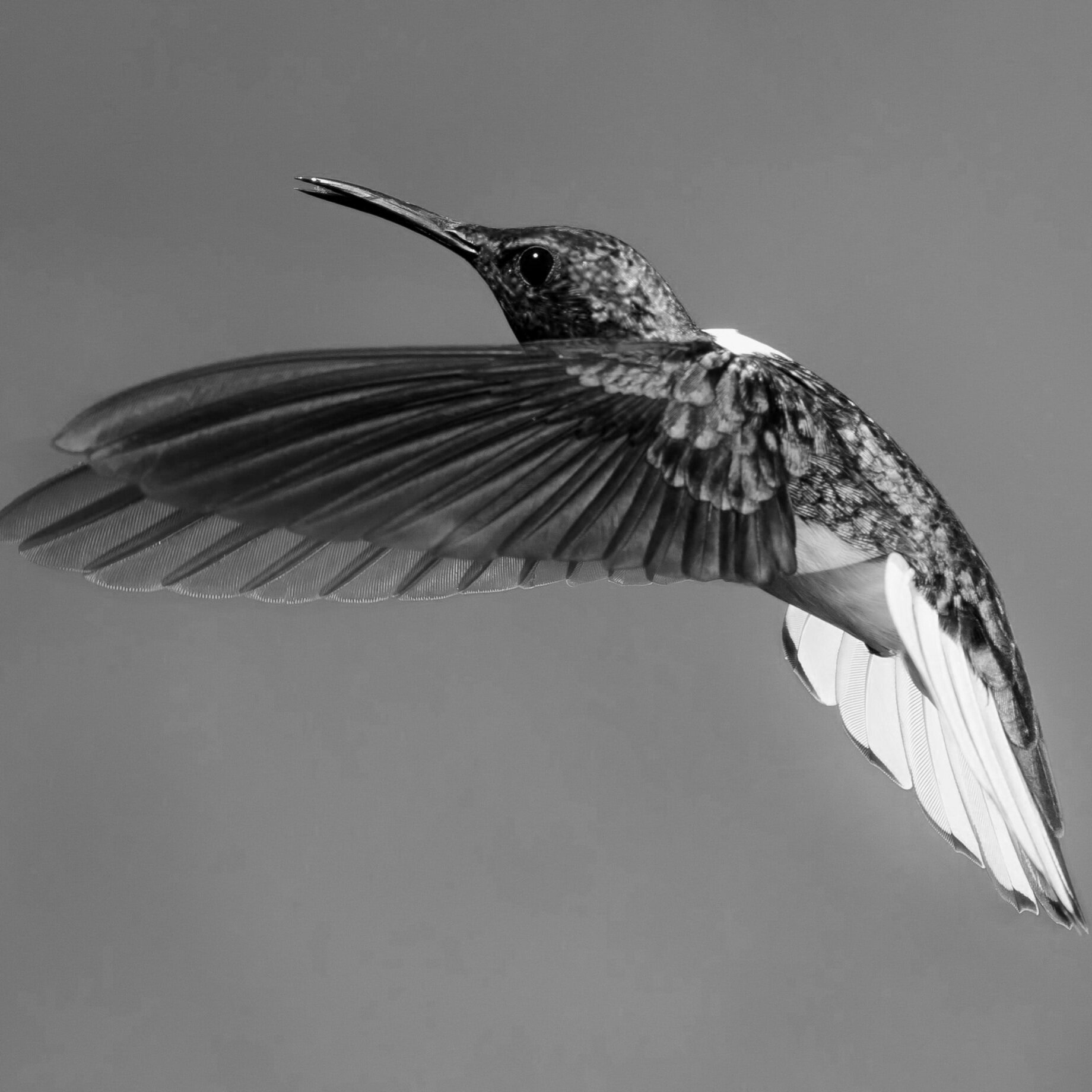Rebecca Foust
Hummingbird
My mother always told me
she would be back
and would be back as a hummingbird.
Very matter of fact, she was,
and it came up more than once,
as in every time we saw a hummingbird
which was a lot most Marches
in Pennsylvania when the redbuds
put on their frilly fuchsia pantaloons,
the birds in frenzied suspension
with their tongues deep in the blooms.
Mom said it again, once,
when she was actually dying.
I mean when she knew it and I knew it
and she knew I knew;
then such things could be said
even in the utter absence
of hummingbirds.
My friends smile when I bring this up
which is a lot because the birds love
the nicotiana, the lavender,
the old roses that riot the yard
half the year. They smile, and ask
how I know. I mean, they get
that everyone becomes atoms
that are made into new creatures,
but how do I know this bird, here,
is her? I am perplexed by the question.
How do you know how to breathe?
Anyway, I know it because she told me.
Conception
A labor day BBQ in a friend’s backyard
with sizzling steaks and canned mushrooms
seared in a dry skillet, a salad
made with mayo and macaroni and olives
from a jar, and scotch, lots of cheap scotch
on the rocks sweetened into Manhattans.
In the yards, yellow lights
buzzed by June bugs and fluttered by moths.
Mom wearing dark eyeliner with the Cleopatra dress
she trimmed with metallic braid
snagged from the mill’s discount bin.
She dances with one husband after the other,
dances on the grass, damp and cool under her feet,
my older sisters tumbling down the warm hill
under the wheeling stars, playing Freeze Tag,
skinning elbows and knees. Dad tries to get mom
to stop until the radio plays “Stardust,” a song
even he can’t resist and then
he’s dancing too, and everyone is laughing
as the trees release something smelling of cumin.
The war is fifteen years behind them.
Walking back home, three sleepy girls in tow,
my parents hold hands for the first time in months,
they hold each other up, and something
—a memory, maybe of the first time they met—
stirs in them both at more or less the same time.
Back home, more scotch stokes the fire
and the house feels safe and warm,
and maybe semi-permanent as my twin brother
and I begin to be born.
Sunset at the Lake
The lake is a flat white page spread
before the blue swell of mountains
beyond the great trunks
of cypress shimmered through
late August heat that distorts
like old gravity glass. There are moments
while swimming to the flat rocks
on the other side when it all melts into merge
and submerge: lake, sky, body
with bounds dissolved, moving without being
conscious of moving, eyes just above
or below a mirror danced with water striders
and goat’s beard fluff, and tassled with pollen.
Light glinting in thrown diamonds,
flat discs on the surface where fish have leapt
and sunk, dragonflies in dun like small drones,
and sailboats making a slow wake a half-lake away.
For the next hundred yards this is all there is
and it is enough; the world fallen away
from ancient woods fragrant with cedar
and fern and bright, yolk-dyed chanterelles,
and it is possible to believe in a magic place
where children float and laugh and eat good food
prepared by their mothers with their own hands,
and all you have to do is get through each day
without hurting the people you love, moments
of only you and a sleek muskrat cutting a diagonal
across the cove, trailing the twigs that will weave
her warm nest, or the osprey dropping down
like lead shot and up again with a silver fish in its talons.
Last night’s sunset lasted forever, a sharp and bright glare
subsiding to a slow red stain across the horizon
and casting garnet and amethyst on the far wall of sky,
reiterated in the still water, and glowing
the steep rock walls until all you know is doubled
or nothing, and in flames, and nothing matters in this instant
but the body’s good tired ache, and these last rays of sun.
Rebecca Foust is the author of three chapbooks and four books including ONLY, forthcoming from Four Way Books in 2022, with poems published widely in venues including The Hudson Review, Narrative, Ploughshares, Poetry, and The Southern Review. Recognitions include the 2020 Pablo Neruda Prize for Poetry judged by Kaveh Akbar, the CP Cavafy and James Hearst poetry prizes, a Marin Poet Laureateship, and fellowships from The Frost Place, Hedgebrook, MacDowell, and Sewanee. Foust is the Poetry Editor for Women’s Voices for Change and co-producer of Rising Voices, a series about poetry for Marin TV.
image by @zmachacek

